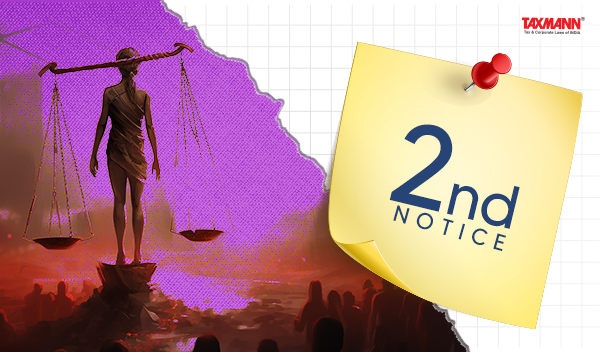[Opinion] Legality of Second Notice Under Section 148 for the Same Assessment Year
- Blog|News|Income Tax|
- 2 Min Read
- By Taxmann
- |
- Last Updated on 4 June, 2024

Dev Agarwal – [2024] 163 taxmann.com 24 (Article)
Introduction
Section 147 of the Income Tax Act , 1961 (hereinafter referred to as ‘IT Act, 1961’) empowers the Assessing Officer (‘AO’) to assess or reassess such income or recompute the loss or the depreciation allowance or any other allowance or deduction for a particular assessment year of an assessee, if any income chargeable to tax has escaped assessment for that assessment year.
Section 148 of the IT Act, 1961 mandates the issuance of notice by AO income escaping assessment.
Section 148A of the IT Act, 1961, which was inserted by the Finance Act, 2021 prescribes the procedural requirement which the AO must adhere to before issuing notice under Section 148 of the IT Act, 1961.
Time Limit for Issuance of Notice Under Section 148 of the Income Tax, Act.
Section 149 of the IT Act, 1961 provides for the time limit for issuance of notice under Section 148. The normal time limit for issuing notice under Section 148 is three years from the end of the relevant assessment year. It also provides that a notice can be issued even beyond three years but not more than ten years from the end of the relevant assessment year if the AO has in his possession books of account or other documents or evidence which reveal that the income chargeable to tax which has escaped assessment amounts to or is likely to amount to fifty lakh rupees or more, in the form of
a. an asset,
b. expenditure in respect of transactions or in relation to an event or occasion, or
c. an entry or entries in the books of amount.
Can a Notice Under Section 148 of the It Act, 1961 Be Issued Twice for the Same Assessment Year?
There are several decisions of the Hon’ble Supreme Court of India and various High Courts that the principle of res-judicata as stated in Section 11 of the Code of Civil Procedure, 1908 does not apply in taxation matters. The Hon’ble Supreme Court in Radhasoami Satsang, Saomi Bagh, Agra v. CIT [1992] 60 Taxman 248/193 ITR 321 has held that : –
“16. We are aware of the fact that strictly speaking res judicata does not apply to income tax proceedings. Again, each assessment year being a unit, what is decided in one year may not apply in the following year but where a fundamental aspect permeating through the different assessment years has been found as a fact one way or the other and parties have allowed that position to be sustained by not challenging the order, it would not be at all appropriate to allow the position to be changed in a subsequent year.”
Therefore, it can be argued that since the principle of res-judicata does not apply in matters pertaining to taxation, the AO is empowered to issue several notices under Section 148 for the same Assessment Year.
Click Here To Read The Full Article
Disclaimer: The content/information published on the website is only for general information of the user and shall not be construed as legal advice. While the Taxmann has exercised reasonable efforts to ensure the veracity of information/content published, Taxmann shall be under no liability in any manner whatsoever for incorrect information, if any.



 CA | CS | CMA
CA | CS | CMA
